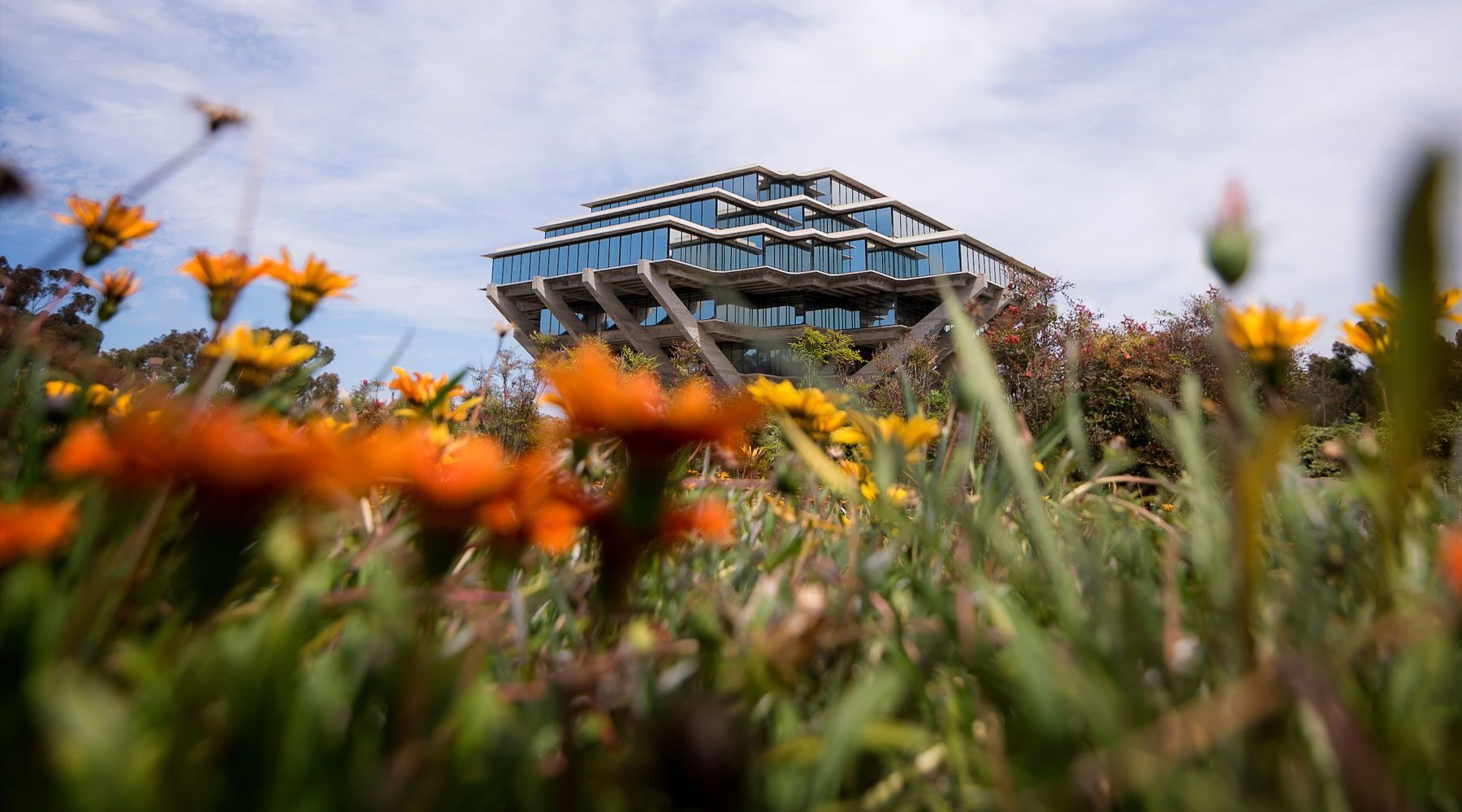Educating Outside the Box
Planting the Seeds for a Healthy Future
Rubi Gomez always knew her passion for engaging and caring for people would lead her to a career in health. It was not until she explored the educational opportunities at the Herbert Wertheim School of Public Health and Human Longevity Science at UC San Diego, however, that she felt solidified in her decision to pursue community-centric public health.
“I took an introductory class with Dean Cheryl Anderson, and her passion in describing what public health can do helped me understand that public health is truly all around us,” Gomez said. “It’s an essential and fundamental aspect of life that we all deal with, and I love being a part of that.”

Rubi Gomez, Bachelor of Science in Public Health ‘23
21st Century School
“We have a truly unique opportunity to do things that are relevant for a 21st century school of public health,” said Cheryl A.M. Anderson, Ph.D., M.P.H., founding dean of the Herbert Wertheim School of Public Health and the inaugural Hood Family Endowed Dean’s Chair in Public Health. “Because we are a new school, we have an opportunity to train the next generation.”
The Herbert Wertheim School of Public Health offers bachelor’s, master’s, and doctoral degrees as well as a general preventive medicine residency program, which empower aspiring public health professionals to nurture their passion, contribute to meaningful change and evolve into leaders who foster positive health outcomes for communities at local, national and global levels.
Established in 2019, the Herbert Wertheim School of Public Health has graduated more than 1,500 students, approximately half of whom have graduated since the school’s founding. In the 2022-2023 academic year alone, more than 200 students successfully completed the bachelor’s program.
In the 2022-2023 academic year, the school revamped program teaching divisions to include Biostatistics and Bioinformatics, Climate and Environmental Sciences, Community Health Services and Preventive Medicine, Epidemiology, Global Health, Health Behavior, Health Policy, Public Mental Health and Substance Use, Technology and Precision Health.
Each of the new teaching divisions aligns with curriculum and priorities of the Herbert Wertheim School of Public Health. They also leverage existing research strengths at UC San Diego to address key 21st century public health challenges.

“It has been exciting to see public health at UC San Diego transform from a department within the School of Medicine to a school in its own right,” said Kimberly Brouwer, Ph.D., professor and associate dean for education and student affairs.
“We have a truly unique opportunity to do things that are relevant for a 21st century school of public health.”
– Cheryl A.M. Anderson, Ph.D., M.P.H.
Bachelor of Science in Public Health
The Bachelor of Science in Public Health program, which launched in 2013, provides seven majors within a comprehensive curriculum, fostering an enriched environment for learning and growth. Students have the opportunity to pursue a bachelor’s degree with concentrations in Biostatistics, Climate and Environmental Sciences, Community Health Sciences, Epidemiology, Health Policy and Management Sciences, and Medical Sciences.
Gomez said that she enjoyed the experiences and breadth of opportunity offered by the program. She expressed extreme pride in her research and in the real-world applications of her academic work, especially when it came to the social assistant and medical support for underserved communities in Tijuana, Mexico.
“I got to see what life is like for people living in Tijuana who receive this help,” Gomez said. “I got to meet and talk with them, which allowed me to see a new perspective, a new side to health, healthcare and research.”
Gomez said her experience in the Herbert Wertheim School of Public Health has been wonderful. The research opportunities and enduring effects of a public health education at UC San Diego led her to not only a degree, but also a breadth of knowledge, understanding and gratification.

Rubi Gomez (right) at the Summer Research Conference at UC San Diego in July 2023.
Master of Public Health
Rita Hedo, M.P.H., epidemiologist for the San Diego County Health and Human Services Agency and a summer 2021 graduate, said the Herbert Wertheim School of Public Health helped prepare her for a rewarding career.
Hedo was drawn into the idea of public health because she was curious as to what drives communities to get sick. Learning the “why” was her driving force. She said that ultimately, prevention aspects of public health led her to pursue a degree in public health.
“I like to see an impact and I like to be a part of that impact to prevent further illness,” said Hedo. “I couldn’t find a career other than public health that allows such authority to make substantial change at a population level.”
The Master of Public Health (MPH) program began in 2018 and offers concentrations in six categories including Epidemiology, Health Behavior, Public Mental Health, Technology and Precision Health, Health Policy, and General Public Health. Since its establishment, the MPH program has graduated 126 students. The most recently added concentration, Health Policy, graduated its founding cohort of students in June 2023.
During the 2022-2023 academic year, the MPH program introduced FMPH 491: Substance Use and Population Health, a course offering a window into the patterns, drivers and consequences of substance use from a public health perspective. The course also introduces various prevention, treatment and harm reduction approaches.
“We felt the course would fill a gap in the electives available on substance use and addiction, which represents a leading cause of preventable morbidity and mortality in the United States and globally,” said course instructor, Angela Bazzi, Ph.D., M.P.H., associate professor.
The diverse, highly relevant course catalog in the MPH program allowed Hedo to directly and immediately apply knowledge learned in the classroom to real-world scenarios, specifically, the infectious disease modeling course in the era of COVID-19.
“The whole concept of COVID-19 connects me back to the FMPH 418 Infectious Diseases: Epidemiological Methods and Emerging Trends course,” said Hedo. “I feel that this course and the disease models taught in the course are referential and help me understand how COVID reoccurs and reinfects.”

Rita Hedo, epidemiologist for San Diego County Health and Human Services Agency
“I couldn’t find a career other than public health that allows such authority to make substantial change at a population level.”
– Rita Hedo, M.P.H., Epidemiologist for San Diego County Health and Human Services Agency
Additionally, epidemiology courses one, two and three helped Hedo in her career as well as health behavior courses that now aid her in navigating tough personalities in the community.
“There are some challenges you face as an epidemiologist when you try to implement recommendations or requirements,” she said. “There will always be behavior, somebody who doesn’t wear a mask, or someone that doesn’t adhere to the vaccination protocols.”
Hedo is currently an expert in respiratory outbreaks and investigates food borne illnesses outbreaks, which includes reporting and enacting quarantine maps in addition to reviewing and implementing best health practices to curb large outbreaks.
“Responding to the COVID-19 global pandemic as an epidemiologist and outbreak subject matter expert was one of the most rewarding experiences in my life,” Hedo said.
As the MPH program continues to grow out of the start-up phase, faculty, staff and academics are geared to not only refine curriculum to address 21st century public health needs, but also expand opportunities and hone their purview as a whole.
“As we continue to send our graduates out into the world to do great work, we will start to build a network of opportunities for our MPH students for practicum placements, capstone projects, and post-graduation job opportunities,” said Sara McMenamin, Ph.D., M.P.H., associate professor and MPH associate program director. “We really hope to stay connected with our alumni to build lasting relationships into the future.”
Joint Doctoral Program in Public Health
Another program with direct implications and real-world career effectiveness is the UC San Diego – San Diego State University Joint Doctoral Program in Public Health (JDP).
Lilian Perez, Ph.D., policy researcher for the RAND Corporation and a 2017 graduate of the JDP Global Health track, said that through the program and her mentor, Elva Arredonda, Ph.D., professor at San Diego State University, she learned about community-based interventions to advance health equity and inform policies as well as how to pursue scientific independence.
“From the start of my time in the JDP, Dr. Arredondo empowered me to build my scientific independence by helping me successfully attain a National Institutes of Health Diversity Supplement followed by an F-31 award, which prepared me well to work at the National Cancer Institute and then one of the nation’s leading research institutions (RAND Corporation) that’s informing policies from the community to national levels,” said Perez.
“During the JDP, I gained critical skills to lead epidemiological and intervention studies and in my current position, I am working towards translating my research to local policy change by using implementation science, with the goal of ensuring the work we do is sustainable, equity-centered and addresses local needs beyond research priorities.”
The JDP offers three tracks: Epidemiology, Health Behavior, and Global Health. It has graduated 211 students since 1990, including 13 students in the 2022-2023 academic year.
Additionally, the JDP has three National Institutes of Health (NIH) T32 fellowship opportunities available to predoctoral students and postdoctoral researchers. With direct integrations of the NIH T32 predoctoral training grant program in data science for behavioral health with computer science and engineering, the JDP is on the forefront of cross-disciplinary collaboration.

Lilian Perez, Ph.D., policy researcher for the RAND Corporation
“Students are vehicles for collaboration and for extending the reach of public health thinking to other disciplines,” said David Strong, Ph.D., professor and JDP program director. “We want people to be thinking about public health issues across different disciplines as they apply.”
Graduate Programs in Biostatistics
The Herbert Wertheim School of Public Health launched the Master of Science in Biostatistics in 2019 and a Doctor of Philosophy in Biostatistics in 2016. Since then, 36 students have graduated, including 14 doctoral students and 22 master’s graduates.
The doctoral program emphasizes both didactic and experiential learning with emphasis on full support throughout the program.
Program years one and two include theoretical and applied classroom work in the core mathematical statistics and biostatistics courses, with additional electives in mathematics and computer science and in the life sciences. While the program is steadily expanding, faculty, academics and staff continue to offer full support.
“As of Spring 2023, we have awarded 14 Doctor of Philosophy in Biostatistics degrees. Five of those graduates currently have academic jobs, several at top universities such as Northwestern University and Vanderbilt University, and others are employed by well-known companies in the biomedical and technology industries,” said Florin Vaida, Ph.D., professor and Doctor of Philosophy in Biostatistics program director.
Ruohui (Matt) Chen, Ph.D., a 2023 graduate, said that while graduate school was tough, he underwent influential learning experiences that will help him in his new position as an assistant professor of medicine and biostatistics in the Northwestern University Feinberg School of Medicine.

Ruohui (Matt) Chen, Ph.D., assistant professor of Preventive Medicine, Feinberg School of Medicine at Northwestern University.
